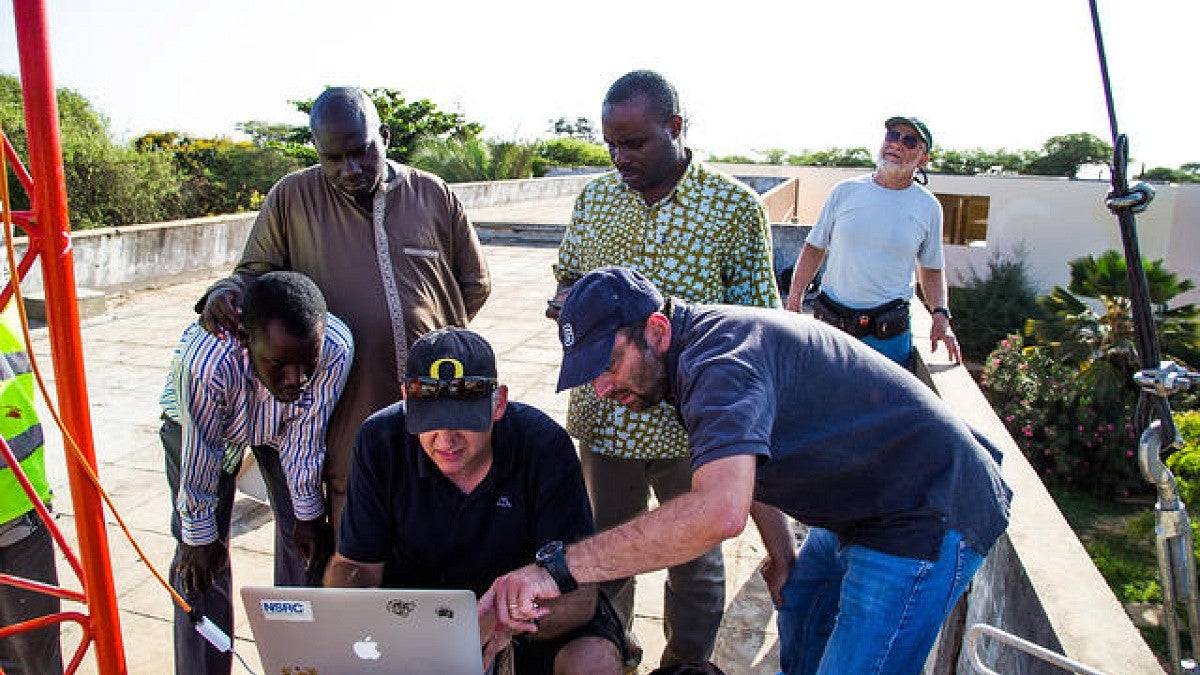The UO-based Network Startup Resource Center and its director, Steven Huter, recently received the 2017 Innovations in Networking Award for Broadband Applications by the Corporation for Education Network Initiatives in California.
A nonprofit organization, the corporation confers the awards for leading-edge developments that leverage ultra-high-bandwidth networking to transform instruction and research. The Network Startup Resource Center was recognized for its globe-spanning work to improve network infrastructure, build professional capacity and facilitate international research collaboration.
Research Connections
“Our research group has collaborated on several projects with the NSRC. The first grew out of seismological field work we were doing in the Galapagos Archipelago. The internet connection at the Charles Darwin Research Station was woefully slow, and a chance discussion with Steve Huter led to beneficial improvements.
"More recently, our research team is building out a seismic monitoring network in Oregon as part of the Pacific Northwest Seismic Network. The goal is to develop a West Coast earthquake early warning system, and we depend on high-speed connectivity to remote locations. Our work will require adoption of new technologies and this is where the NSRC has been invaluable. They are my go-to source on campus for understanding state-of-the-art computer networking connections."
Professor Doug Toomey
UO Department of Earth Sciences
“(The center's team members) have done outstanding work in reaching out to developing countries. ...Through them, U.S. researchers are richer and blessed to be connected to thousands of scientists from those countries who are able to join us for science discovery and to share global culture and values.”
William Y.B. Chang
Former head of East Asian and Pacific Region, National Science Foundation
“During the quarter century that this group has been helping to build internet infrastructure around the world, there’s hardly a place on the planet that has not been touched by the great work” of the Network Startup Resource Center, noted presenter Larry Smarr, a professor of computer science and engineering at University of California, San Diego, where the award was presented March 20.
Funded by the National Science Foundation and Google, with additional contributions from dozens of public and private organizations, the startup center comprises a distributed team of network engineers and trainers who live in Asia, the Pacific Islands, Africa, Europe, Latin America and Eugene. Working with universities, government agencies, internet service providers, regional internet registries, nongovernmental organizations and industry, they facilitate scholarly communication and research collaborations across borders via the power of the internet.
“NSRC does a masterful job connecting developing regions of the world to global scientific and educational resources, including the great research and discoveries that come out of the University of Oregon,” said Scott Coltrane, UO provost and senior vice president. “For decades, the center has specialized in building network communications infrastructure and local engineering capacity in places where inadequate connectivity poses a barrier to collaborating with U.S. scientists and educators.”
Stateside in Eugene, the center works closely with several UO departments and organizations, including Network and Telecom Services, UO Libraries, the Department of Computer and Information Science, the Global Studies Institute in the Office of International Affairs, the Route Views Project and Wired Humanities Projects. The center also works to extend career-skills-based employment opportunities to UO students, particularly qualified international students.
Adriene Lim, dean of Libraries and Philip H. Knight Chair, noted that the center is a valued collaborator in harmony with the library’s goals and mission.
“Through their work, they provide access to information, enhance intellectual freedom and facilitate the sharing of knowledge for the good of humanity — all of which are near and dear to librarians’ hearts,” she said. “We are extremely proud and grateful to have Steve and his team as colleagues.”
The roots of the center trace back to a 1988 volunteer effort to support networking in a number of countries in southern Africa. In the decade that followed, the center played a key role in helping establish the first links to the Internet in Peru, Egypt, Guinea, Sri Lanka, Kenya, Liberia, Tanzania and Togo.
Huter said the center’s foundation is built on a request-driven model. That means individuals and institutions in the partner nations launch their own projects, then approach the center for assistance in developing and implementing them.
To date, the startup center has aided the distribution of more than 650 tons of network equipment and technical reference books to more than 120 countries worldwide. Current projects in Uganda include working with the Research and Education Network for Uganda, including Makere University, which hosts the Infectious Diseases Institute and is partially sponsored by the U.S. Centers for Disease Control and National Institutes of Health.
“Working with (the Research and Education Network for Uganda) engineers over the past few years has been truly rewarding,” said Hervey Allen, the center’s assistant director. “Their impressive advances in connecting research institutions and well-designed campus networks across Uganda is a testament to the power and effectiveness that both technical and human networks can bring.”
David Conover, UO vice president for research and innovation, summarized the center’s reach and impact.
“The center’s team has fueled research and innovation by providing technological support, network infrastructure and other elements needed to make research collaborations flourish around the world,” Conover said. “We congratulate Steven Huter and his entire team on this well-deserved award and thank (the Corporation for Education Network Initiatives in California) for recognizing the outstanding efforts of the center.”
—Jason Stone, Library Communications


